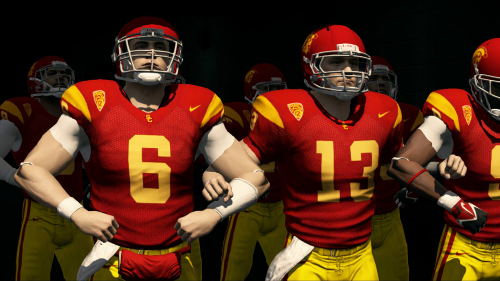Major Defense for EA in Likeness Suit Struck Down by Appeals Court

A federal appeals court turned in a split decision today overruling the argument by Electronic Arts that the First Amendment gave them protection as free expression and artistic works in the representation of players in college video games. The 2-1 ruling prevents the company from using the First Amendment as a defense against collegiate athletes who feel their likeness has been misused but it does not represent closure on the subject by any means.
The majority ruled by stating EA “does not qualify for First Amendment protection as a matter of law because it literally recreates (Sam) Keller in the very setting in which he has achieved renown”. Also cited were accuracies concerning height, weight, skin tone, build, hair color, home state, handedness, and year of eligibility. The ability to edit player names for jerseys and share them got mention as being problematic.
The dissenting opinion was written that “because the creative and transformative elements of Electronic Arts’ NCAA Football video game series predominate over the commercial use of the athletes’ likenesses, the First Amendment protects EA from liability”.
The company will now appeal this decision by the 9th Circuit Court and the Supreme Court seems likely to make the final determination. It’s worth noting The 9th is one of the most reversed courts in the nation. Since 2005 78% of their cases that have reached the Supreme Court have been reversed.
In the process of making the argument EA had pointed to other media including movies which are not subject to judgments based on incorporating someone’s name or likeness. Consider for example 2010’s The Social Network. Mark Zuckerberg was not involved in the making of the film (or the book it was adapted from “The Accidental Billionaires”) yet his name, likeness, and story were used without any legal recourse.
In a separate decision the appeal brought by Jim Brown regarding the dismissal of the claim from 2009 that EA had used his likeness in Madden games was rejected by the court unanimously. Brown had argued that a player similar in make-up to himself (as with NCAA players the company didn’t use his name) represented a “false endorsement” of the product. The court determined his appearance was “artistically relevant” and EA never attempted to mislead consumers about any personal involvement with the product.
Today’s decisions don’t affect the current attempt at being dismissed from the lawsuit prior to the decision on whether it will be certified as class action. EA has been granted a September 5th hearing to argue that they should not be a defendant in the case given they were only following the NCAA’s rules.
Earlier/Summary Below
The player likeness lawsuit against the NCAA, CLC, and Electronic Arts is the culmination of two high profile filings that were combined as led by Sam Keller and Ed O’Bannon (and O’Bannon now heads it up). It alleges improper use of player likeness through various forms of merchandise and media including video games in which the parties in question conspired to avoid paying players for their rights. Some interesting details and claims regarding the case at hand were revealed when EA was reentered as a defendant after initially being dismissed.
EA originally won a previous case regarding player likeness with the courts ruling video games are artistic works rather than commercial speech and therefore protected by the First Amendment. The Supreme Court in 2011 established forms of media, producing expressive works of art, are not subject to judgments based on incorporating someone’s name or likeness. That dismissed case however, involving Ryan Hart, has resurfaced after an appeals court reversed a decision based on that argument.
Recent uncovered emails have shown that NCAA representatives were well aware that players in games were based off real-life players. At one point the NCAA and EA had nearly reached an agreement to have actual player names included in the products. The EA Locker / Roster Share feature was a fallback option. With momentum clearly on the plantiffs’ side NCAA reps have begun to publicly express concern over the future of collegiate sports. A former EA Sports producer admitted players in NCAA games were based off real athletes.
The discovery of Tim Tebow’s name being in NCAA Football 10 could throw another wrench into EA’s series of arguments. Depositions from former Alabama wide receiver Tyrone Prothro and UConn basketball guard Tate George support the defendant’s reasoning for denying class action certification. The class action hearing resulted in the judge heavily questioning the legitimacy of a potential class and insisting a current athlete be involved. The judge required current athletes be added as plaintiffs for that party to have representation if the case is certified as class action. Six current college football players were added as plaintiffs in mid-July. EA is now arguing to be dismissed as a defendant in the suit.
This consolidated case in California if certified as class action would go to trial – barring a settlement – and ultimately be the determining factor of how the NCAA proceeds in the future handling broadcasting rights, merchandising, and video games. Should a negative result come down, which one analyst has pegged as being a potential loss of $1 billion for EA, it would likely not just end the NCAA Football series but also with it any realistic possibility of college sports games being made in the future. The trial now is slated to begin June 2014. Appeals following a decision could extend the fight through 2020.
